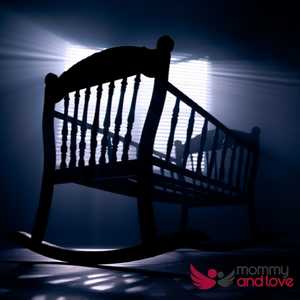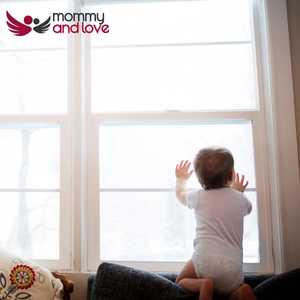It can be tough to know whether you should keep your newborn’s room dark or light.
On one hand, some people say that keeping a newborn’s room dark will help them sleep better. Others say that keeping the room light will help them adjust to the world around them sooner and help them learn to sleep better in the day.
A dark room is considered the most optimal sleep condition. Babies aren’t born with the circadian rhythm which is the body’s process of regulating the sleep-wake cycle. Additionally, a dark, quiet environment encourages babies to sleep.
Affiliate Disclaimer: As an Affiliate, we earn from qualifying purchases.
Does a Dark Room Help Baby Sleep?

A dark room helps a baby younger than six weeks sleep better because it allows the body to produce more melatonin even though she hasn’t learned about day and night rhythm.
Melatonin is a hormone that helps control sleep cycles, and light breaks down melatonin. When the sun goes down and darkness occurs, the pineal gland activates.
The pineal gland, located in the brain, is involved in melatonin production.
When rooms are brighter, babies have lower levels of melatonin during the day. This makes it harder for them to fall and stay asleep. Doing nap time in a dark room helps increase melatonin levels, making it easier for babies to sleep.
However, keep in mind that every baby’s sleep cycle is different so don’t worry too much. If your baby can’t sleep in a pitch-black sleeping room, use some night lights and see if they help.
So if you’re looking for a way to help your baby sleep better, try creating a dark environment for naps and nighttime sleep.
Even though a darker room offers better quality sleep for younger babies, you should still watch out for your child’s sleep and tired signs. Also, sleeping in a dark room also helps with sleep training where you can make your baby learn how to sleep on his own and self-settle. If you sleep train your baby, make sure to keep the room dark.
Can Babies Sleep in a Light Room During Naps?

You may worry that their baby is not getting enough sleep if they are napping in a room with minimal light. However, babies are still able to get the necessary rest even if they are in a well-lit room.
In fact, exposing babies to some light during their naps can actually help them to better regulate their sleep-wake cycles.
So, if you are wondering whether or not it is okay for your baby to sleep or take a baby nap in a light room, the answer is yes under the right circumstances. Babies aren’t born with a circadian rhythm so they’re not impacted by a light or dark room.
Just be sure to keep an eye on your little ones when they take their naps to make sure they are comfortable and not becoming too stimulated by the light.
How Dark Does a Baby’s Room Need to Be?
Parents need to make sure their baby’s sleep environment is dark and distraction-free.
As children get older, they become more social and curious. It is always a good idea to keep their rooms dark so they can fall asleep without being distracted by toys or other objects in the room. This will help them to get a good night sleep.
The sleepy hormone melatonin is important for healthy sleep. It’s produced when it’s dark, so make sure your child’s room is dark enough. This will help with common problems such as difficulty napping, falling asleep at bedtime, and early-bird wake-ups.
How to Blackout Your Baby’s Room?
It can be difficult to get your baby to sleep through the night, especially if there is a lot of light coming into their room.
One way to help your child sleep better during the day or at night time is to create a pitch-black room as a night sleep environment. Here are four ways that you can do this:
Use Blackout Curtains or Blackout Blinds
Blackout curtains or blinds or any room darkening shades are a great way to block out light. They can also help keep the room cool in summer and warm in winter. It might also help block any sounds that might wake a sleeping baby.
If you use blackout curtains, make sure they are made from breathable fabric so that they don’t trap heat in the room.
You can pull them up in the morning if you need white light sources to keep your baby awake and then pull them down if your baby is ready for his usual morning nap or bedtime.
Hang a Dark Sheet or Blanket Over the Window
If you don’t have a blackout curtain, you can hang a dark sheet or blanket over the window. This also will help to block out light.
Use Stickers or Tape to Cover Up Windows
If you don’t have blackout curtains or blinds, you can use stickers or tape to cover up windows. You can buy them from most hardware stores.
Attach Blackout Lining to Your Existing Curtains
To attach the blackout lining, simply sew it to the back of your existing curtains. Alternatively, you can use Velcro to attach the blackout lining to the back of your curtains. This will allow you to remove the blackout lining when your baby no longer needs a dark room.
Use Aluminum Foil
Aluminum tin foil is inexpensive and helps block light from entering your baby’s room. Simply tape the aluminum foil to the inside of your window frame. Make sure that the shiny side of the foil is facing out so that it reflects the light away from the room.
Remove All Electronics
Electronic gadgets that emit blue light can be stimulating which is why they’re helpful in the morning to help us stay awake but not so much at night.
Conclusion on Newborn Sleeping in a Dark Room
Babies need darkness to sleep well. A dark room is the best environment for babies to get a good night’s sleep. If you’re looking for ways to help your baby sleep better, try sleeping in a dark room.
However, if you’re still struggling to get your child to go to sleep, seek one-on-one help from a sleep consultant. Not only will it help your baby sleep and nap better but it will also help the whole family sleep better.
FAQs on Babies Sleeping in Dark Rooms
When Should You Introduce a Night Light?
Most children are afraid of the dark at some point in their lives. For some, this fear is short-lived and they soon outgrow it. But for others, the fear of the dark can persist into childhood and beyond.
If your child is afraid of the dark, you may want to consider introducing a night light. This usually happens somewhere around the age of two.
There is no set age at which you should introduce a night light. It depends on your child’s individual fear of the dark and how much comfort they derive from having a light on at night.
If your child is afraid of the dark but sleeps soundly with a night light, there is no need to make any changes.
However, if your child is afraid of the dark and has difficulty sleeping, a night light may help them to feel more comfortable and ease their fears.
Are Babies Scared of the Dark?
Most babies are not afraid of the dark. In fact, they may find it calming and soothing. The reason for this is that babies tend to sleep better in the dark because they are being used to the same environment since they were in the womb. To them, the darkness is a familiar and comfortable place, and no, babies don’t have nightmares!
Is It Safe to Have Curtains in Nursery?
Curtains can be safe in the nursery if they are the right length. This means that they should be short enough so that your child cannot reach them and pull them down.
Some parents worry about the cords on curtains, but if you make sure that the cords are out of reach of your child then there is no need to worry.
So, in short, yes it is safe to have curtains in the nursery provided that they are of the right length. This will ensure that your child cannot pull them down and hurt themselves.

This article was written by: Gian MIller – Full-Time Writer, Baby Whisperer & Dad of 3.
Gian spends a lot of his time writing. A self-proclaimed baby whisperer, Gian has been through it all with his own children and is passionate about sharing his hard-won wisdom with other parents. When he’s not writing or changing diapers, you can find him playing the guitar or watching baseball (or preferably both at the same time).






